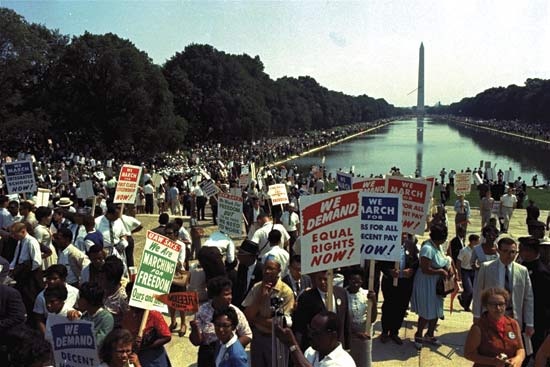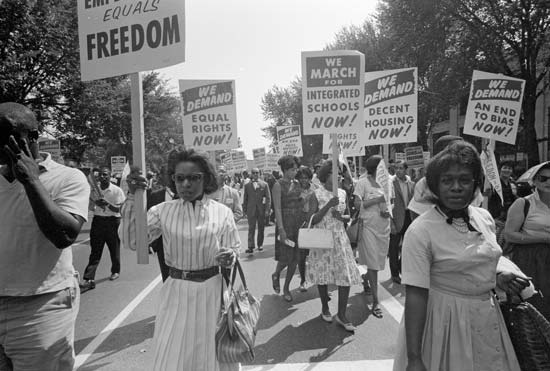March on Washington
United States history
in full March on Washington for Jobs and Freedom

 political demonstration held in Washington, D.C. (Washington), in 1963 by civil rights (civil rights movement) leaders to protest racial discrimination and to show support for major civil rights legislation that was pending in Congress.
political demonstration held in Washington, D.C. (Washington), in 1963 by civil rights (civil rights movement) leaders to protest racial discrimination and to show support for major civil rights legislation that was pending in Congress. On Aug. 28, 1963, an interracial assembly of more than 200,000 people gathered peaceably in the shadow of the Lincoln Memorial to demand equal justice for all citizens under the law. The crowd was uplifted by the emotional strength and prophetic quality of the address given by Martin Luther King, Jr., (King, Martin Luther, Jr.) that came to be known as the “I Have a Dream” speech, in which he emphasized his faith that all men, someday, would be brothers. The rising tide of civil rights agitation greatly influenced national opinion and resulted in the passage of the Civil Rights Act of 1964, guaranteeing equal voting rights, outlawing discrimination in restaurants, theatres, and other public accommodations involved in interstate commerce, and encouraging school desegregation.
On Aug. 28, 1963, an interracial assembly of more than 200,000 people gathered peaceably in the shadow of the Lincoln Memorial to demand equal justice for all citizens under the law. The crowd was uplifted by the emotional strength and prophetic quality of the address given by Martin Luther King, Jr., (King, Martin Luther, Jr.) that came to be known as the “I Have a Dream” speech, in which he emphasized his faith that all men, someday, would be brothers. The rising tide of civil rights agitation greatly influenced national opinion and resulted in the passage of the Civil Rights Act of 1964, guaranteeing equal voting rights, outlawing discrimination in restaurants, theatres, and other public accommodations involved in interstate commerce, and encouraging school desegregation.- Jean Balue
- Jean-Baptiste-André Dumas
- Jean-Baptiste-Antoine-Marcelin, baron de Marbot
- Jean-Baptiste-Antoine-Marcelin Marbot, baron de
- Jean-Baptiste Bessières, duke d'Istrie
- Jean-Baptiste Biot
- Jean-Baptiste Bouillaud
- Jean-Baptiste Bourguignon d' Anville
- Jean-Baptiste Boussingault
- Jean-Baptiste Carpeaux
- Jean-Baptiste Carrier
- Jean-Baptiste Colbert
- Jean-Baptiste Colbert, Marquis De Seignelay
- Jean-Baptiste Colbert, marquis de Torcy
- Jean-Baptiste Colbert Torcy, marquis de
- Jean-Baptiste, count d'Erlon Drouet
- Jean-Baptiste, Count Jourdan
- Jean-Baptiste de Boyer Argens, marquis d'
- Jean-Baptiste de Boyer, marquis d' Argens
- Jean-Baptiste-Donatien de Vimeur, comte de Rochambeau
- Jean-Baptiste-Donatien de Vimeur Rochambeau, comte de
- Jean-Baptiste Drouet
- Jean-Baptiste Drouet, count d'Erlon
- Jean-Baptiste, duke d'Istrie Bessières
- Jean-Baptiste du Val-de-Grâce, baron de Cloots